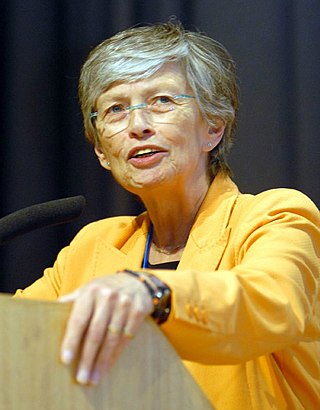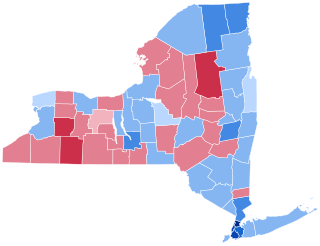
Carol Bellamy is an American nonprofit executive and former politician. She is chair of the board of the Global Community Engagement and Resilience Fund (GCERF). Previously, she was director of the Peace Corps, executive director of the United Nations Children's Fund (UNICEF), and president and CEO of World Learning. She is also the chair of children's rights advocacy organization ECPAT International, working to end the sexual exploitation of children. After three terms in the New York State Senate, she was the first woman to be elected to any citywide office in NYC as President of the New York City Council, a position she held until her unsuccessful bid for Mayor of New York in 1985; she was the second to last person to hold this position.

The 2004 United States presidential election was the 55th quadrennial presidential election, held on Tuesday, November 2, 2004. The Republican ticket of incumbent President George W. Bush and his running mate incumbent Vice President Dick Cheney was re-elected to a second term. They narrowly defeated the Democratic ticket of John Kerry, a United States senator from Massachusetts and his running mate John Edwards, a United States senator from North Carolina.
Arthur Jay Finkelstein was a New York state-based Republican Party (GOP) consultant who worked for conservative and right-wing candidates in the United States, Canada, Israel, Central Europe, and Eastern Europe over four decades.

The 2009 election for Mayor of New York City took place on Tuesday, November 3. The incumbent Mayor, Michael Bloomberg, an independent who left the Republican Party in 2008, won reelection on the Republican and Independence Party/Jobs & Education lines with 50.7% of the vote over the retiring City Comptroller, Bill Thompson, a Democrat, who won 46.3%. Thompson had won the Democratic primary election on September 15 with 71% of the vote over City Councilman Tony Avella and Roland Rogers. This was the fifth straight mayoral victory by Republican candidates in New York despite the city's strongly Democratic leaning in national and state elections.
Andrew J. Spano is an American politician who served as Westchester County Executive from 1998 to 2009. Spano was defeated by challenger Rob Astorino in the November 2009 election.

Michael Joseph Spano is an American politician who is the 42nd mayor of Yonkers, New York. He is a member of the Democratic Party. A former Republican, he served as a member of the New York State Assembly.

The 1996 United States Senate election in South Dakota was held on November 4, 1996. Incumbent Republican U.S. Senator Larry Pressler ran for re-election to a fourth term, but was narrowly defeated by Democratic nominee Tim Johnson by 9,000 votes. Pressler was the only incumbent Senator to lose reelection in the 1996 election cycle, of which this was the only Democratic flip. Pressler later ran again unsuccessfully for this seat in 2014 as an Independent.

The New York City mayoral election of 1997 occurred on Tuesday November 4, 1997, with incumbent Republican mayor Rudy Giuliani soundly defeating Democratic Manhattan Borough President Ruth Messinger and several third-party candidates. This was the first time Brooklyn voted for a Republican since 1941.

New York held various elections on November 7, 2006. Most notably, elections were held for the state governor, attorney general, comptroller, and for the U.S. Senate, all of which saw Democrats win and build on their existing majority. While Democrats had already been a strong force in the New York City area, most of the Democratic gains in 2006 occurred upstate. Former Attorney General Eliot Spitzer won the 2006 gubernatorial election by a record margin, while Andrew Cuomo replaced him as the new attorney general. Alan Hevesi was re-elected as comptroller, despite mounting ethics concerns. Hillary Clinton was re-elected to the Senate. For the first time in over 50 years, all major statewide elected offices were held by one party. For the first time in over 60 years, they were all held by Democrats.

The 1986 New York gubernatorial election was held on November 4, 1986, to elect the Governor and Lieutenant Governor of New York. Incumbent Democratic governor Mario Cuomo defeated Republican Andrew O'Rourke, the County Executive of Westchester County in a landslide. Cuomo carried all but 5 counties.

The 1982 New York gubernatorial election was held on November 2, 1982, to elect the Governor and Lieutenant Governor of New York. Incumbent Democratic Governor Hugh Carey chose not to run for a third term, which resulted in an open race. Democratic nominee Mario Cuomo, the Lieutenant Governor of New York, narrowly defeated Republican Lewis Lehrman, a banker who ran as a conservative.

The 2012 United States presidential election in New York took place on November 6, 2012, as part of the 2012 United States presidential election in which all 50 states plus the District of Columbia participated. Voters chose 29 electors to represent them in the Electoral College via a popular vote pitting incumbent Democratic President Barack Obama and his running mate, Vice President Joe Biden, against Republican challenger and former Massachusetts Governor Mitt Romney and his running mate, Congressman Paul Ryan.

The 1993 New York City mayoral election was held on Tuesday, November 2. Incumbent Mayor David Dinkins ran for re-election to a second term, but lost in a rematch with Republican Rudy Giuliani.

A general election was held in the U.S. state of Washington on November 8, 2016. The primary was held on August 2.

The 2018 United States House of Representatives elections were held on November 6, 2018, as part of the 2018 midterm elections during President Donald Trump's term, with early voting taking place in some states in the weeks preceding that date. Voters chose representatives from all 435 congressional districts across each of the 50 U.S. states to serve in the 116th United States Congress. Non-voting delegates from the District of Columbia and four of the five inhabited U.S. territories were also elected. On Election Day, Republicans had held a House majority since January 2011.

The Chicago mayoral election of 1971, held on April 6, 1971, was a contest between incumbent Democrat Richard J. Daley and Republican Richard E. Friedman. Daley won by a landslide 40% margin, and it was his fifth consecutive mayoral win, the longest serving mayor of Chicago until that time.

The 2020 United States presidential election in New York was held on Tuesday, November 3, 2020, as part of the 2020 United States presidential election in which all 50 states plus the District of Columbia participated. New York voters chose electors to represent them in the Electoral College via a popular vote, pitting the Republican Party's nominee, incumbent President Donald Trump, and running mate Vice President Mike Pence against Democratic Party nominee, former Vice President Joe Biden, and his running mate California Senator Kamala Harris. New York had 29 electoral votes in the Electoral College. Trump announced that Florida would be his home state for this election, rather than New York as it had been previously. This was the first presidential election in New York to allow no-excuse absentee voting.

The 2024 United States presidential election will be the 60th quadrennial presidential election, set to be held on Tuesday, November 5, 2024. Voters in each state and the District of Columbia will choose electors to the Electoral College, who will then elect a president and vice president for a term of four years.
Social media was used extensively in the 2020 United States presidential election. Both incumbent president Donald Trump and Democratic Party nominee Joe Biden's campaigns employed digital-first advertising strategies, prioritizing digital advertising over print advertising in the wake of the pandemic. Trump had previously utilized his Twitter account to reach his voters and make announcements, both during and after the 2016 election. The Democratic Party nominee Joe Biden also made use of social media networks to express his views and opinions on important events such as the Trump administration's response to the COVID-19 pandemic, the protests following the murder of George Floyd, and the controversial appointment of Amy Coney Barrett to the Supreme Court.

The 1986 New York State Comptroller election took place on November 4, 1986, to elect a candidate to the position of Comptroller. Republican nominee and incumbent Comptroller Edward Regan defeated Democratic nominee Herman Badillo, resulting in his election to the third of four consecutive terms he held as comptroller.




















